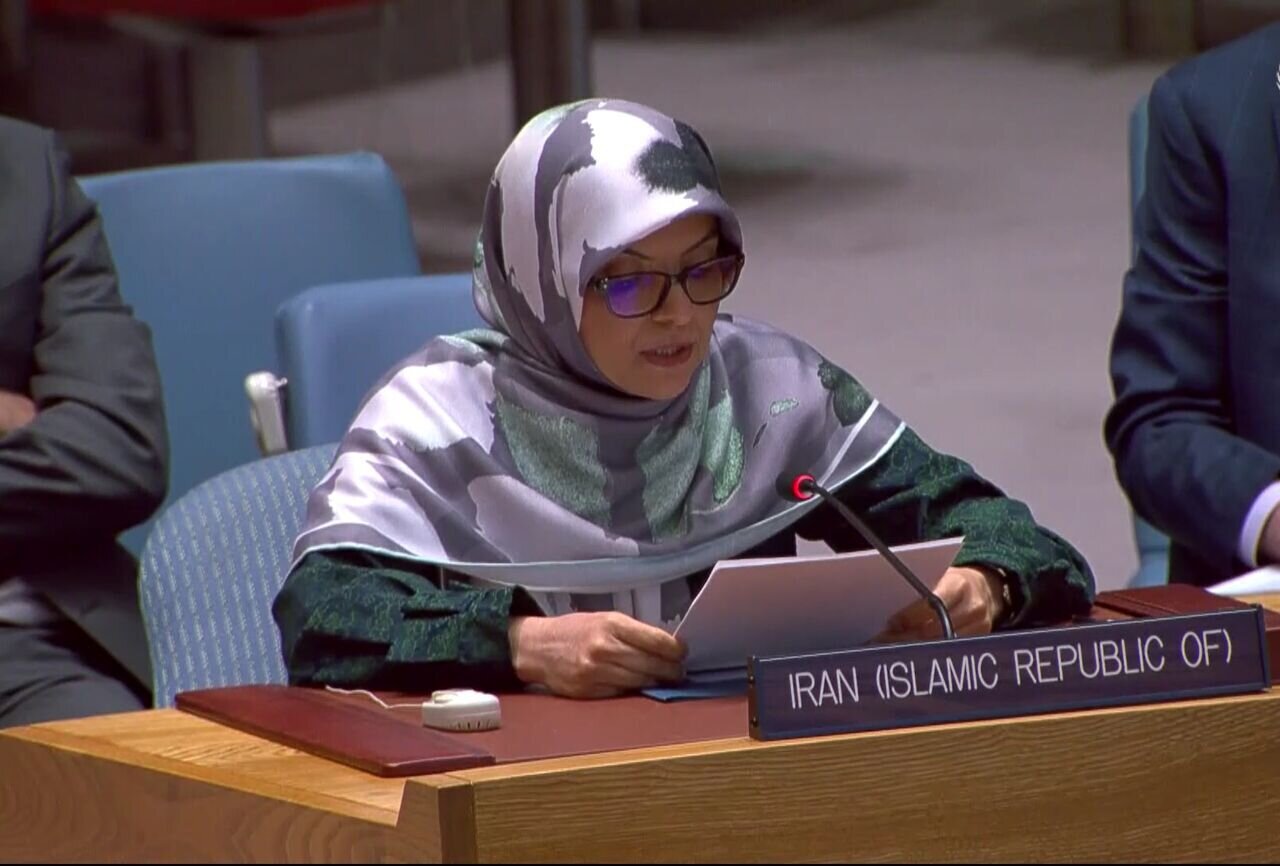TEHRAN- Zahra Ershadi, ambassador and deputy permanent representative of Iran to the UN, has urged the Western nations to change their approach toward Syria.
Speaking during a UN Security Council meeting on “the situation in the Middle East: (Syria)”, Ershadi underlined on Tuesday the necessity for Western nations to reevaluate their strategy in order to help restore regional security, peace, and prosperity.
In her statement, Ershadi highlighted the challenges presented by the ongoing humanitarian situation in Syria, despite the diligent efforts of the UN.
The full text of Ershadi’s statement is as follows:
We thank the briefers for their updates and informative briefings.
As highlighted in today's briefings, despite the UN’s diligent efforts, the humanitarian situation in Syria continues to present challenges.
The current level of funding allocated for the Syrian humanitarian response falls far below what is needed. This severe shortage of funding severely hinders the UN's ability to provide adequate assistance to those in need.
Furthermore, the persistent imposition of unilateral sanctions remains a significant impediment to the improvement of Syria's humanitarian and economic situation. These unlawful measures have further exacerbated the challenges faced by the Syrian people and severely hampered the capacity of the Syrian government to deliver critical services to those in need, and even delaying the return of refugees and internally displaced people.
To effectively address the humanitarian and economic crisis in Syria, a comprehensive approach is crucial. This approach should encompass several key elements, including securing sufficient funding, ensuring impartial distribution of aid, and removing unilateral sanctions.
Such an approach not only saves lives but also lays the foundation for the restoration of infrastructure, the rebuilding of communities, and the revitalization of the Syrian economy.
In addition, it is essential to prioritize early recovery projects that address the immediate needs of all Syrians affected by the ongoing crisis. These projects should aim to provide comprehensive support and assistance to those impacted, facilitating their path towards recovery and resilience.
Simultaneously, substantial efforts must be directed for enhancing the delivery of humanitarian aid across all regions of Syria. This includes a specific focus on improving cross-line aid delivery, as outlined in Resolution 2672(2023).
We extend our appreciation to the Syrian government for its unwavering commitment to supporting the United Nations and other international organizations in facilitating the delivery of relief and support to crisis-affected areas.
We particularly commend the Syrian government for its decision to extend the permission to use the Bab Al Salam and Al Rai border crossings for an additional three months, until August 13, 2023. This extension enables the crucial delivery of humanitarian aid to Syrian civilians in need, particularly in Northwestern Syria.
Terrorism remains a significant threat to Syria and the wider region and must be addressed decisively. We are concerned about terrorist activities in the areas under occupation. The illegal presence of military forces in Syria is the primary source of insecurity in the country and must be ended in order to create a conducive environment for crisis resolution.
The fight against terrorism must be carried out in full respect of Syria's national sovereignty, territorial integrity, and independence, and without using it as a pretext to violate these fundamental principles of international law.
Regarding the political track, we continue to extend our support to the Special Envoy's sincere efforts and commend his active engagement with all parties involved in the resolution of the Syrian crisis. We welcomed the Special Envoy's visit to Tehran on 15 May, during which he held discussions on the latest humanitarian and political situation in Syria with Iran's Foreign Minister and other Iranian relevant authorities.
Iran stands firmly behind the prompt resumption of the Constitutional Committee meetings. We are committed to supporting this process.
Moreover, Iran, in collaboration with its partners in the Astana format, Russia, and Turkiye, remains unwavering in its commitment to working towards long-term and sustainable normalization in Syria. In this context, we fully endorse and support the continuation of the Syrian-Turkish dialogue, recognizing it as a crucial component of such broader efforts.
It is noteworthy that on 10 May, the Foreign Ministers of Russia, Iran, Syria, and Turkiye convened in Moscow to engage in discussions regarding the re-establishment of interstate relations between Syria and Turkiye. The talks comprehensively addressed various aspects, with a firm emphasis on upholding Syria's sovereignty, territorial integrity, and the need to fight against terrorism.
We would like also to highlight the two-day official visit by Iran's president to Syria, which marked the first visit by an Iranian president in over 13 years. During this visit, the two presidents signed a comprehensive agreement on long-term and strategic cooperation between our two countries in Damascus.
We are pleased to note the recent positive developments in Syria's diplomatic relations, both within the region and internationally.
The return of Syria to the Arab League and the resumption of relations with our Arab brotherly countries mark significant strides in helping Syria’s security, stability, and prosperity.
This constructive approach reaffirms the effectiveness and legitimacy of Iran's policy and its allies in the region in defending the national sovereignty and territorial integrity of Syria as well as backing the legal government of Syria during 12 years of crisis in the country.
We hope that Western countries will soon reassess and rectify their policy towards Syria. By doing so, they can contribute to the restoration of stability, peace, and prosperity in the region.
And lastly, Madam. President, the international community's failure to address the Israeli regime's ongoing acts of aggression and terrorist attacks against Syria's sovereignty and territorial integrity is deeply concerning.
These reprehensible acts, like the recent terrorist attacks targeting Damascus and its surrounding areas on 28 May 2023, which deliberately aimed at civilian infrastructure, flagrantly violate international humanitarian law and the principles enshrined in the UN Charter. They pose a grave threat to regional peace and stability. We strongly condemn these heinous crimes and emphasize the urgent need for swift and decisive action to hold such a lawless regime accountable.


No comments:
Post a Comment